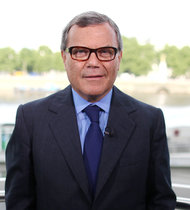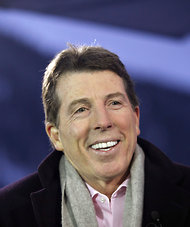 Simon Dawson/Bloomberg NewsMartin Sorrell, chief executive of WPP, has responded to criticisms on pay packages.
Simon Dawson/Bloomberg NewsMartin Sorrell, chief executive of WPP, has responded to criticisms on pay packages.
 Simon Dawson/Bloomberg NewsRobert Diamond of Barclays was the highest-paid executive among FTSE 100 companies.
Simon Dawson/Bloomberg NewsRobert Diamond of Barclays was the highest-paid executive among FTSE 100 companies.
LONDON – Pay for top managers in Britain rose 10 percent last year, a report released on Tuesday showed, providing fresh ammunition for critics who argue that executive pay has become excessive.
Chief executives of Britain’s 100 largest publicly traded companies received a median pay increase of 10 percent last year, according to a report by Manifest, a proxy voting agency, and MMK, which advises on remuneration. That is higher than Britain’s inflation rate of 3 percent, and the median executive package was about 200 times more than the average pay of employees in the private sector.
Shareholders are increasingly fighting back against pay packages that they consider to be too excessive at a time of economic turmoil and a volatile stock market environment. Firms in the United States and Europe, including Citigroup, UBS, Credit Suisse and Barclays, have faced shareholder revolts against their pay practices this year.
In Britain, the insurance firm Aviva and the oil company Cairn Energy had their remuneration reports rejected this year by shareholders in a nonbinding vote. Aviva’s chief executive later resigned over the controversy.
Anthony Watson, chairman of the remuneration committee of the British lender Lloyds Banking Group, conceded to a parliamentary committee on Tuesday that when it came to executive pay, not “everything in the garden is rosy.”
“Have individuals got paid too much in the past? Yes, because a lot of variable pay has morphed into fixed pay,” he said as part of a government inquiry into corporate compensation.
WPP, one of the largest advertising companies, is expected to face strong shareholder opposition for its pay packages at the annual shareholder meeting on Wednesday. Martin Sorrell, the firm’s chief executive, received £11.6 million ($18.1 million) last year, making him Britain’s second-highest paid executive among FTSE 100 companies, according to the Manifest report.
Robert E. Diamond Jr. of Barclays, who made £21 million, was the highest-paid executive in the survey, while David Brennan of the pharmaceutical company AstraZeneca ranked third, with a pay package of £11.3 million.
Median base salaries for FTSE 100 chief executives rose 2.5 percent last year, but packages were lifted by larger long-term incentive pay and deferred bonuses, according to the report. The median total pay of an executive rose 10 percent, to £3.7 million, even as the value of stocks in the FTSE 100 index dropped 5 percent.
Some chief executives, including Mr. Sorrell, have responded to criticisms over their pay. In an editorial titled “Mea culpa – I act like the owner I am” in The Financial Times on June 5, Mr. Sorrell wrote: “I find the controversy over my compensation deeply disturbing.” He continued: “The most wounding comment, made anonymously, is that I deserve a ‘bloody nose’ because I have been behaving as an owner, rather than as a ‘highly paid manager.’ If that is so, mea culpa. I thought that was the object of the exercise, to behave like an owner and entrepreneur and not a bureaucrat, who loads up with ‘heads I win, tails you lose’ options by just being there.”
His comments won support last week from Ivan Glasenberg, chief executive of the mining giant Glencore International. Mr. Glasenberg is also embroiled in a pay controversy because shareholders criticized awards for the head of Xstrata, the company he is in the process of merging with Glencore.
“If you want a good C.E.O., you have to pay for it,” Mr. Glasenberg said, adding that shareholders have to decide whether they want a “caretaker manager” or someone who behaves like an owner of the company.
Apart from the size of the pay checks, shareholder criticism has focused on the lack of transparency in executive pay, which now often includes bonuses paid in shares and deferred for several years. Some investors also complained about the lack of independence of remuneration committees, saying they did not consult enough with shareholders.
John Lee, managing partner at FIT Remuneration Consultants, told the parliamentary inquiry that pay needed to become more transparent and simple but that investors also needed to build greater trust in remuneration committees. “We’ve all hidden behind formulae” to calculate the level of remuneration instead of having “enough faith in remuneration committee members to apply their judgment,” Mr. Lee said.
Mr. Watson of Lloyds said he met about twice with each of the bank’s large shareholders to discuss pay, including with officials of the British government, which bailed out the bank in 2008.
He told the inquiry that he usually asked for their input before calculating pay, but added: “What we wouldn’t do is say ‘We’re thinking of paying this person this. Do you think that’s O.K.?’”
Article source: http://dealbook.nytimes.com/2012/06/12/executive-pay-rises-10-in-britain-adding-to-debate/?partner=rss&emc=rss
Speak Your Mind
You must be logged in to post a comment.